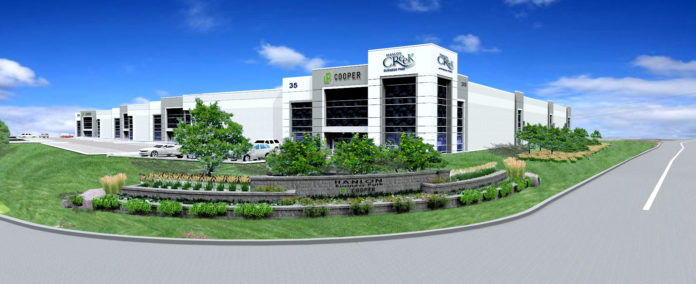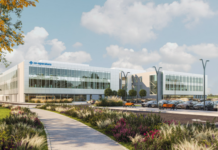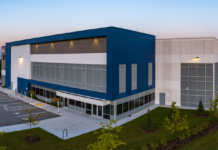Available City-owned land consists of the Hanlon Creek Business Park, with future developments planned such as the Guelph Innovation District. Hundreds of acres of employment lands in Guelph’s south will be the underpinning of the city’s economic future for years to come. “A key economic driver is having available employment lands for business investment and expansion,” said Barbara Maly, manager of economic development with the City of Guelph.
“It’s important for a community to be ready for new investors and employment. This is a good example of how we’re planning our community. We have a nice balance of employment lands and residential to go forward into the future.”
The lands have been earmarked for employment development for well over 20 years. The first phase of the 675-acre Hanlon Creek Business Park (HCBP) is primarily owned by the City and is just over 50 per cent sold. The business park has frontage on the Hanlon Parkway (Highway 6 North) and is just a few minutes to Highway 401.
About 40 acres remain in the City holdings, in parcels ranging from about 3 acres to almost 14 acres. The zoning is flexible to allow a wide variety of uses. Tenants include Fusion Homes, Raymond James, Granite Works, Woodhaven Furniture, RLP Accountants and Jam School.
The 156-year-old Halwell Mutual Insurance Company moved into a 14,500 square foot head office that more than doubled the space of its previous Guelph location.
The HCBP is also home to industrial materials distributer Würth Canada, a German multinational that relocated from Mississauga in 2014. A 120,000-square-foot bright red building serves as the headquarters and distribution hub for the company’s eastern Canada operations.
“Guelph is really blossoming very nicely in the market right now,” said Peter Whatmore, executive managing director for southwestern Ontario for commercial realtor CBRE.
“There is a lot of attractiveness there in being the first community west of the Greenbelt. The whole world changes inside the Greenbelt.”
That has meant both tremendous residential growth and strong employment development. As an investment sector, Guelph is very strong, he says, with better returns than the GTA and substantially the same risk.
“The Hanlon business park is very attractive to GTA companies because industrial land in Guelph averages about $350,000 an acre. If you can find anything in Milton, you’re looking at $800,000 or more an acre.”
The second, 140-acre phase of the HCBP, is owned by Cooper Construction and includes an industrial mall and office centre on about 20 acres. Much of what remains is general and prestige industrial in parcels of 20 to 70 acres.
The HCBP features a combined heat and power cogeneration facility and a 165-acre environmental reserve, including 12 km of walking trails.
“What is unique is that the park has been constructed around an environmental reserve with nature trails, allowing employees to enjoy the natural scenery outside of their workplace,” said Maly. (The third phase, roughly 110 acres, is yet to be graded or serviced.)
“Guelph is very cost competitive, especially compared to the GTA. The cost of land and development charges is very competitive in Guelph,” said Ken Nevar, president of Cooper Construction.
“Guelph also has low unemployment, a good lifestyle and a city actively trying to attract more industry,” added Bill Luffman, vice-president of development at Cooper.
The company has developed and leased about 580,000 square feet of space in four industrial buildings over the last eight years just across the Hanlon Parkway in the 300 acre Southgate Business Park.
This park includes 1080 Southgate Dr., a 23.5-acre industrial development that recently received the Certified Site designation from the Ministry of Economic Development and Growth. It’s the first such certified site for Guelph and is being marketed by Colliers International. The designation tells a potential investor that all servicing, studies and approvals are in place and the land is development ready.
Maly in the city’s economic development department says Guelph is outpacing the growth of many other Canadian cities.
“We are strategically located in a unique nexus between Waterloo to the west and the GTA to the east. We are in an ideal location in Ontario’s tech corridor and our quality of life is second to none.”
Along with strong highway corridors, companies have access to a 25-mile, City-owned Guelph Junction Railway that connects to CN and CPR rail networks, and a labour force built on the foundations of the University of Guelph and Conestoga College, both providing talent for a highly diversified economy.
“Advanced manufacturing is the largest sector in Guelph but there’s also lots of growth in CleanTech, such as renewable energy, water and soil remediation, agri-tech and agri-food and biotech. Guelph is the Canadian headquarters for a number of global companies,” said Maly.
That includes automotive parts giant Linamar, Canada’s second-largest auto parts maker, which employs more than 8,000 people at 24 sites in Guelph.
“Guelph plays a huge role in the country’s agri-food sector. The University of Guelph is renowned as Canada’s Food University. Recently, the university received a $77-million research grant aimed at developing sustainable agri-food technologies to produce enough food for a growing global population. It’s advancing the growth of this innovative sector,” said Maly.
The City promotes economic development opportunities to potential investors, developers and realtors in a tour called Quest for the West. The most recent one showcased the HCBP, along with other employment lands, the university’s research parks, and investment opportunities in Guelph’s downtown.
Ted Davis, broker of record and managing director of Avison Young, says his company is seeing strong interest in the HCBP from manufacturers, technology companies, and financial firms.
“What’s been primary for big-box manufacturers is distribution points. We just finished a deal with Regency Fireplaces before the building is even built. They are relocating to Guelph to consolidate their light manufacturing and distribution.”
Companies are motivated by highway links, border access, and development costs but mostly by affordable real estate and good quality of life for their employees, said Davis. Guelph delivers on both scores.
“The number of people commuting from Guelph and Waterloo into the GTA is significant but companies are now locating their businesses where their employees are coming from.”
Those employees enjoy a much lower cost of living but also a community with its own identity, he says. “There is a sense of independence in Guelph and a real, standalone culture.
The Guelph Advantage
- Excellent transportation links to millions of consumers in Canada and the U.S.
- An internationally recognized University of Guelph with access to 17,500+ students and 1,200+ graduates.
- Well educated and skilled workforce at competitive wage rates.
- Access to a variety of employment lands and buildings at competitive prices.
- Competitive business costs and access to a wide range of business support services.
- Quality of life that provides an active and healthy lifestyle that is second to none
















